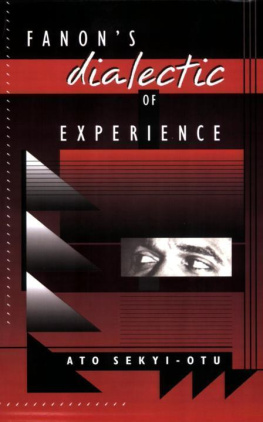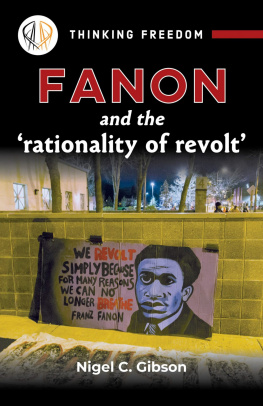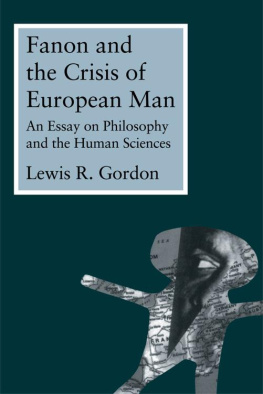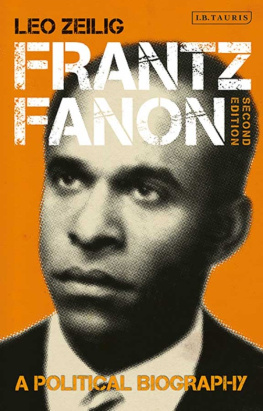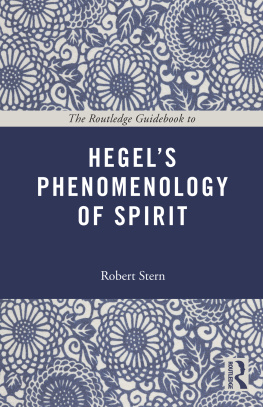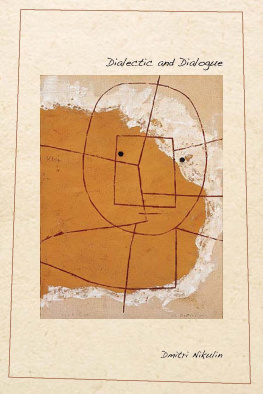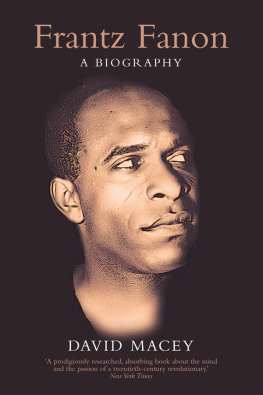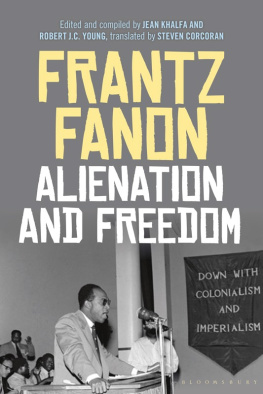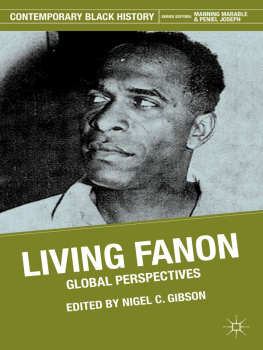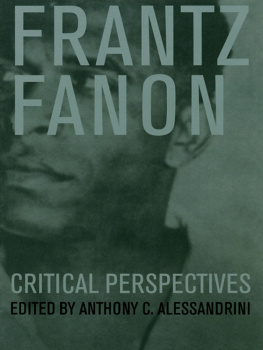Ato Sekyi-Otu - Fanon’s Dialectic of Experience
Here you can read online Ato Sekyi-Otu - Fanon’s Dialectic of Experience full text of the book (entire story) in english for free. Download pdf and epub, get meaning, cover and reviews about this ebook. year: 2012, genre: Romance novel. Description of the work, (preface) as well as reviews are available. Best literature library LitArk.com created for fans of good reading and offers a wide selection of genres:
Romance novel
Science fiction
Adventure
Detective
Science
History
Home and family
Prose
Art
Politics
Computer
Non-fiction
Religion
Business
Children
Humor
Choose a favorite category and find really read worthwhile books. Enjoy immersion in the world of imagination, feel the emotions of the characters or learn something new for yourself, make an fascinating discovery.
- Book:Fanon’s Dialectic of Experience
- Author:
- Genre:
- Year:2012
- Rating:5 / 5
- Favourites:Add to favourites
- Your mark:
- 100
- 1
- 2
- 3
- 4
- 5
Fanon’s Dialectic of Experience: summary, description and annotation
We offer to read an annotation, description, summary or preface (depends on what the author of the book "Fanon’s Dialectic of Experience" wrote himself). If you haven't found the necessary information about the book — write in the comments, we will try to find it.
Fanon’s Dialectic of Experience — read online for free the complete book (whole text) full work
Below is the text of the book, divided by pages. System saving the place of the last page read, allows you to conveniently read the book "Fanon’s Dialectic of Experience" online for free, without having to search again every time where you left off. Put a bookmark, and you can go to the page where you finished reading at any time.
Font size:
Interval:
Bookmark:

ATO SEKYI-OTU
With deepest love and immeasurable gratitude
I am indebted in so many ways to several people for the gestation and completion of this book. I must first express my gratitude to Alkis Kontos for insisting a long time ago that I write on Fanon, and for years of intellectual stimulation and unflinching friendship through joyful and tragic times. Alkis, firstling of the common humanity Fanon envisioned, thank you.
I would also like to thank other friends and colleagues who, through a judicious admixture of coercive flattery, tough love, and gentle censure, prodded me to keep on keeping on, especially at those moments when the mind was willing but the spirit flagged: Lorraine Markotic, Herb Addo, Fred Case, Himani Bannerji, Patrick Taylor, Althea Prince, Paget Henry, Anani Dzidzienyo, loan Davies, Modupe Olaogun, Mwikali Kieti, and James Oscar, Jr.-particularly the lastnamed, for sharing with me his sensitivity to Fanon's dramaturgical vocabulary.
Thanks are also due to my students at York University, especially successive members of my graduate Social and Political Thought seminar "Marxism and Political Discourse," with whom I first dis cussed my rethinking of Fanon's project. I am grateful to York University for a sabbatical leave in the 1992-93 academic year which permitted me to write the book. I wish to thank Michelle van Beusekom for her diligent preparation of the manuscript. Many thanks to Lindsay Waters for his prompt attention to my manuscript and Maria Ascher for her superb editorial work.
To my children, Efua, Ato, Kurankye, and Kobina, I am enormously grateful for their loving support and especially for understanding the perverse manner in which I have contrived to rearrange the natural rhythms of sleep, work, and living. As for my wife and best friend, Mansa, I think she probably knows why this book is dedicated to her.
i
AR Toward the African Revolution: Political Essays.
Trans. Haakon Chevalier. New York: Grove Press, 1967. Translation of RA.
BS Black Skin, White Masks.
Trans. Charles Lam Markmann. New York: Grove Press, 1967. Translation of PN.
DC A Dying Colonialism.
Trans. Haakon Chevalier. New York: Grove Press, 1967. Translation of SR.
DT Les Damnes de la terre.
Paris: Francois Maspero, 1968.
PN Peau noire, masques blancs.
Paris: Editions du Seuil, 195z.
RA Pour la revolution africaine: Ecrits Politiques.
Paris: Francois Maspero, 1969.
SR Sociologie d'une revolution.
Paris: Francois Maspero, 1968.
WE The Wretched of the Earth.
Trans. Constance Farrington. New York: Grove Press, 1991. Translation of UT.
Note: Translations that I have revised are marked "RT."
The imagination that produces work which bears and invites rereadings, which motions to future readings as well as contemporary ones, implies a shareable world and an endlessly flexible language.
-TONI MORRISON, Playing in the Dark
Is it perhaps in the nature of intellectual artifacts to defy in the rhythms of their fame and demise all semblance of sequential order? In the decade or so immediately following the untimely death of Frantz Fanon in 1961, writers produced a steady stream of commentaries on his life and work-journalistic assessments, scholarly papers, and full-length books. Irene Gendzier's Frantz Fanon: A Critical Study, published in 1973, may conveniently be taken as marking the end of this first prolific wave of Fanon studies. Then, in the remainder of the 1970s, came a period of relative neglect and intermittent attention. Some doctoral dissertations apart, Emmanuel Hansen's Frantz Fanon: Social and Political Thought (1977) stands out as the major published work on Fanon in that period.
A veritable renaissance of Fanon studies occurred in the 198os. Someday a historical sociology of knowledge will perhaps shed some light on the reasons for this remarkable revival. Among its notable products are: L. Adele Jinadu, Fanon: In Search of the African Revolution (1980, 1986); Jock McCulloch, Black Soul, White Artifact: Fanon's Clinical Psychology and Social Theory (1983 ); Hussein Abdilahi Bulhan, Frantz Fanon and the Psychology of Oppression (1985); and Patrick Taylor, The Narrative of Liberation: Perspectives on Afro-Caribbean Literature, Popular Culture and Politics (1989). Although Taylor's book is not exclusively devoted to Fanon, it identifies Fanon's texts as a paradigmatic instance of what he calls "liberating narrative"-as distinct from "mythical narrative"-in Afro-Caribbean discourse. As exemplifications of this "liberating narrative," Taylor offers a sustained and compelling account of the philosophy of existence and conception of culture that informed Fanon's psychiatric practice and political project. The significance of that political project for contemporary postimperial history has been eloquently evoked by no less a witness of our times than Edward Said. In his magisterial Culture and Imperialism, Said salutes the "visionary and innovative quality of Fanon's final work [The Wretched of the Earth]" for "the remarkable subtlety with which he forcibly deforms imperialist culture and its nationalist antagonist in the process of going beyond both toward liberation."'
But it is to the collective enthusiasm of so-called colonial discourse theorists and postcolonial critics that we owe the current explosion of interest in Fanon. Headed since the mid-i98os by Homi Bhabha and inspired by postmodernist visions of the auspicious impurity of being, these theorists and critics have discovered in Fanon a precocious if sometimes perfidious ancestor. I applaud the tremendous contribution of Bhabha and kindred scholars to the Fanon renaissance. But although I am not unmindful of the preoccupations of these critics, I depart from their overwhelming concentration upon the significance of Fanon's work for understanding the psychodynamics of otherness and marginality. I revisit Fanon's work as an African who, though trained, employed, and residing in the West, is exercised first and foremost by the disasters of the postindependence experience in Africa. I reread Fanon in light of that experience and the hopes and fears it inspires as South Africa-no doubt a unique society, yet an emblematic instance, in Fanon's eyes, of the colonial condition-reinvents itself: reinvents itself, with Nelson Mandela already delivering stern remonstrances, in ominously Pan-African fashion, against "the forces of anarchy and chaos," against all those benighted enough to think that injustice, despite or rather because of the official abrogation of apartheid, is alive and well; all those who are in consequence misguided enough to proclaim the revolution in permanence. In thus making contemporary African history the impetus for my return to Fanon, I am attempting to redress an imbalance noted by Kenneth Mostern-namely, the almost exclusive concern of recent Fanon studies with the diaspora of the metropolis.'
Font size:
Interval:
Bookmark:
Similar books «Fanon’s Dialectic of Experience»
Look at similar books to Fanon’s Dialectic of Experience. We have selected literature similar in name and meaning in the hope of providing readers with more options to find new, interesting, not yet read works.
Discussion, reviews of the book Fanon’s Dialectic of Experience and just readers' own opinions. Leave your comments, write what you think about the work, its meaning or the main characters. Specify what exactly you liked and what you didn't like, and why you think so.

